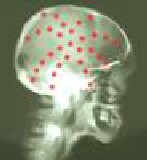- Double Mastectomy May Offer No Survival Benefit to Women With Breast Cancer
- Toxic Lead Found in Cinnamon Product, FDA Says
- Certain Abbott Blood Sugar Monitors May Give Incorrect Readings
- Athletes Can Expect High Ozone, Pollen Counts for Paris Olympics
- Fake Oxycontin Pills Widespread and Potentially Deadly: Report
- Shingles Vaccine Could Lower Dementia Risk
- Your Odds for Accidental Gun Death Rise Greatly in Certain States
- Kids From Poorer Families Less Likely to Survive Cancer
- Tough Workouts Won’t Trigger Cardiac Arrest in Folks With Long QT Syndrome
- At-Home Colon Cancer Test Can Save Lives
Scans Show Brain-Connection Differences in Those With Epilepsy


People with a certain type of epilepsy have widespread, abnormal brain connections that could provide clues for diagnosis and treatment, new research suggests.
The study included 24 people with left temporal lobe epilepsy, the most common form of focal (partial) epilepsy. Partial seizures do not involve the entire brain. People with temporal lobe epilepsy experience seizures that start in the temporal lobe. These are located on each side of the brain, just above the ears.
Researchers used MRI to compare the brains of the epilepsy patients and a group of 24 people without epilepsy. Epilepsy patients had 22 percent to 45 percent fewer long-range connections in the brain’s “default-mode network” compared to people without the condition.
This set of brain regions is active when the mind is at rest and allowed to wander or daydream.
The epilepsy patients also had 85 percent to 270 percent more local connections within and beyond the default-mode network. This may be an adaptation to having fewer long-range connections, noted the study authors.
The findings are published in the Nov. 19 online edition of the journal Radiology.
“Our long-term goal is to see if we can we predict . . . who will respond to surgery and who will not,” Dr. Steven Stufflebeam, of Massachusetts General Hospital, said in a journal news release.
More information
The U.S. Centers for Disease Control and Prevention has more about epilepsy.
Source: HealthDay
Copyright © 2024 HealthDay. All rights reserved.










